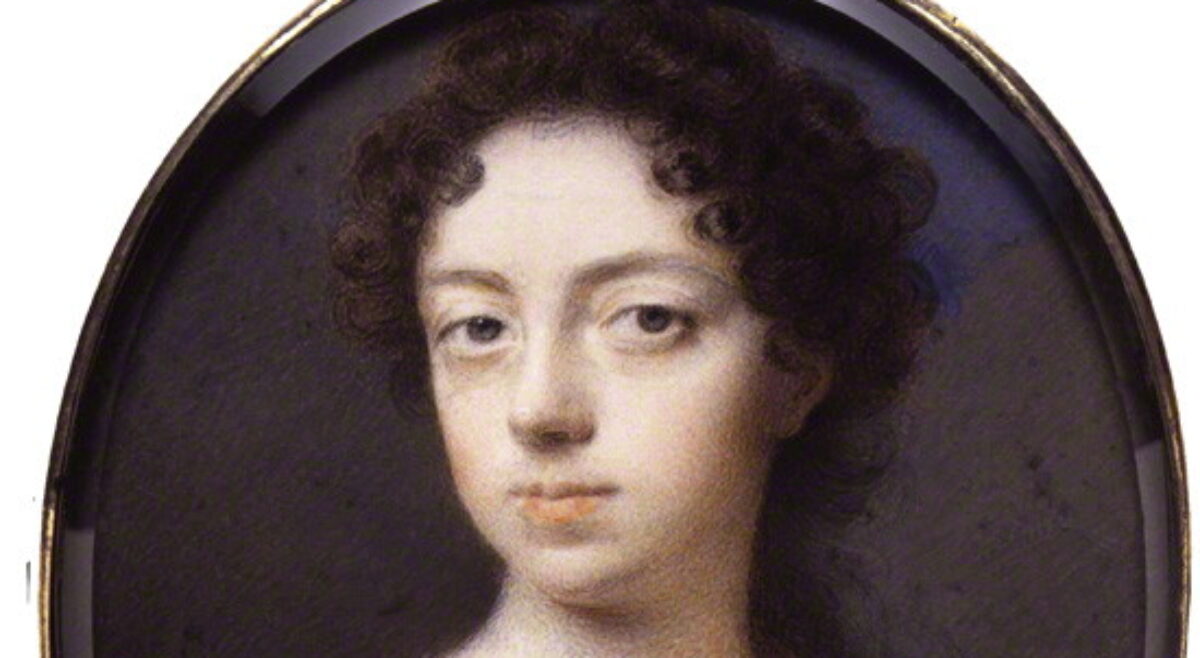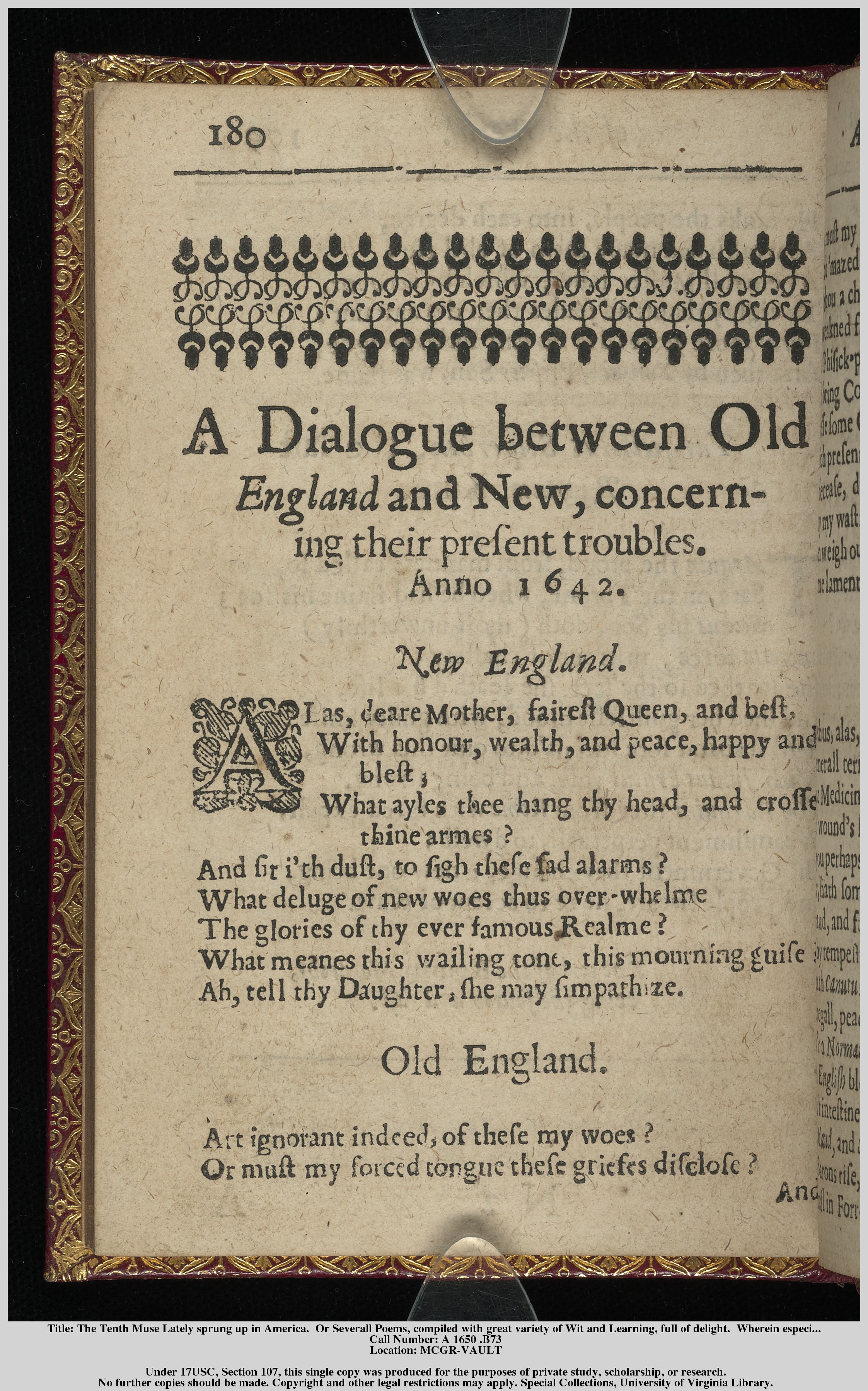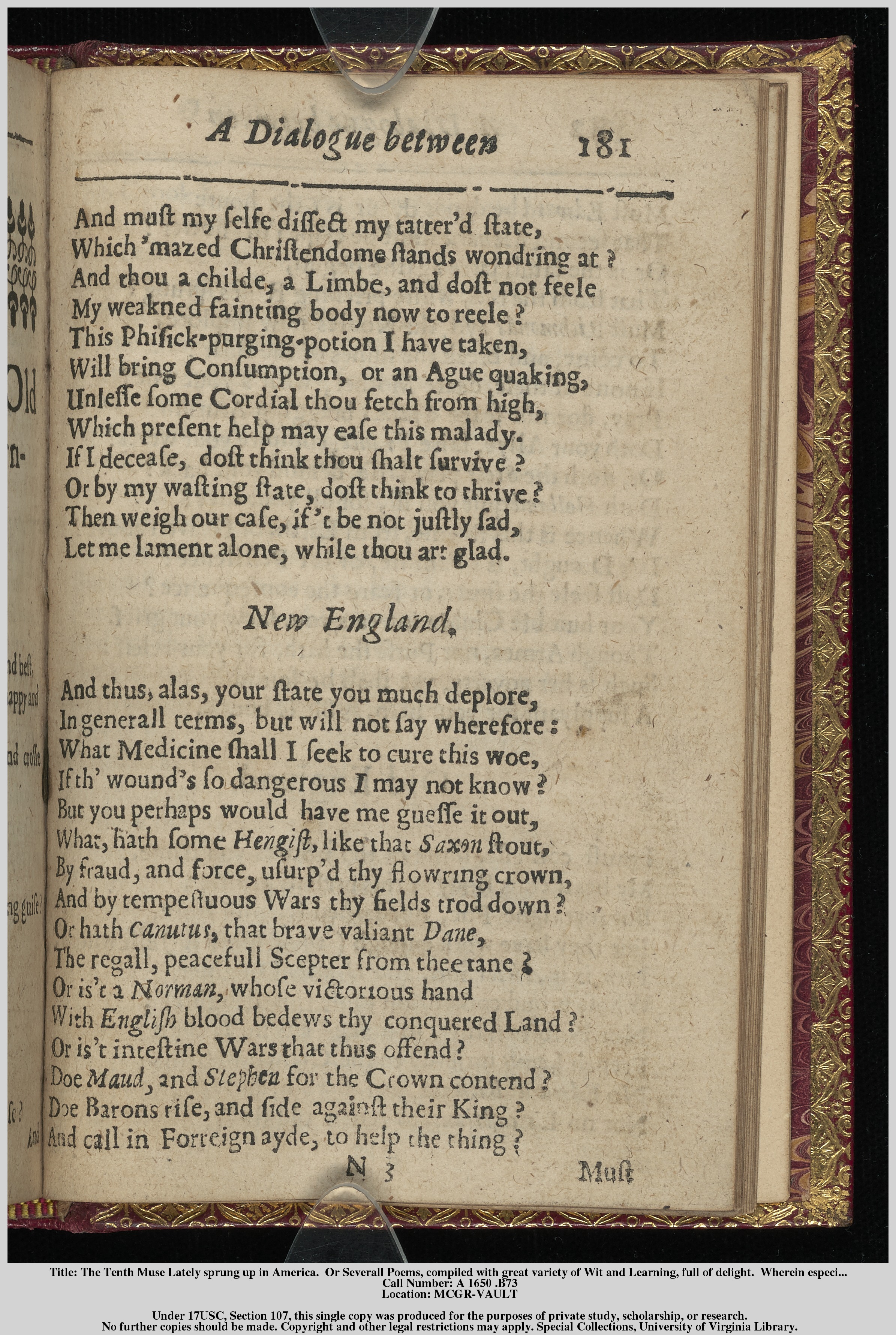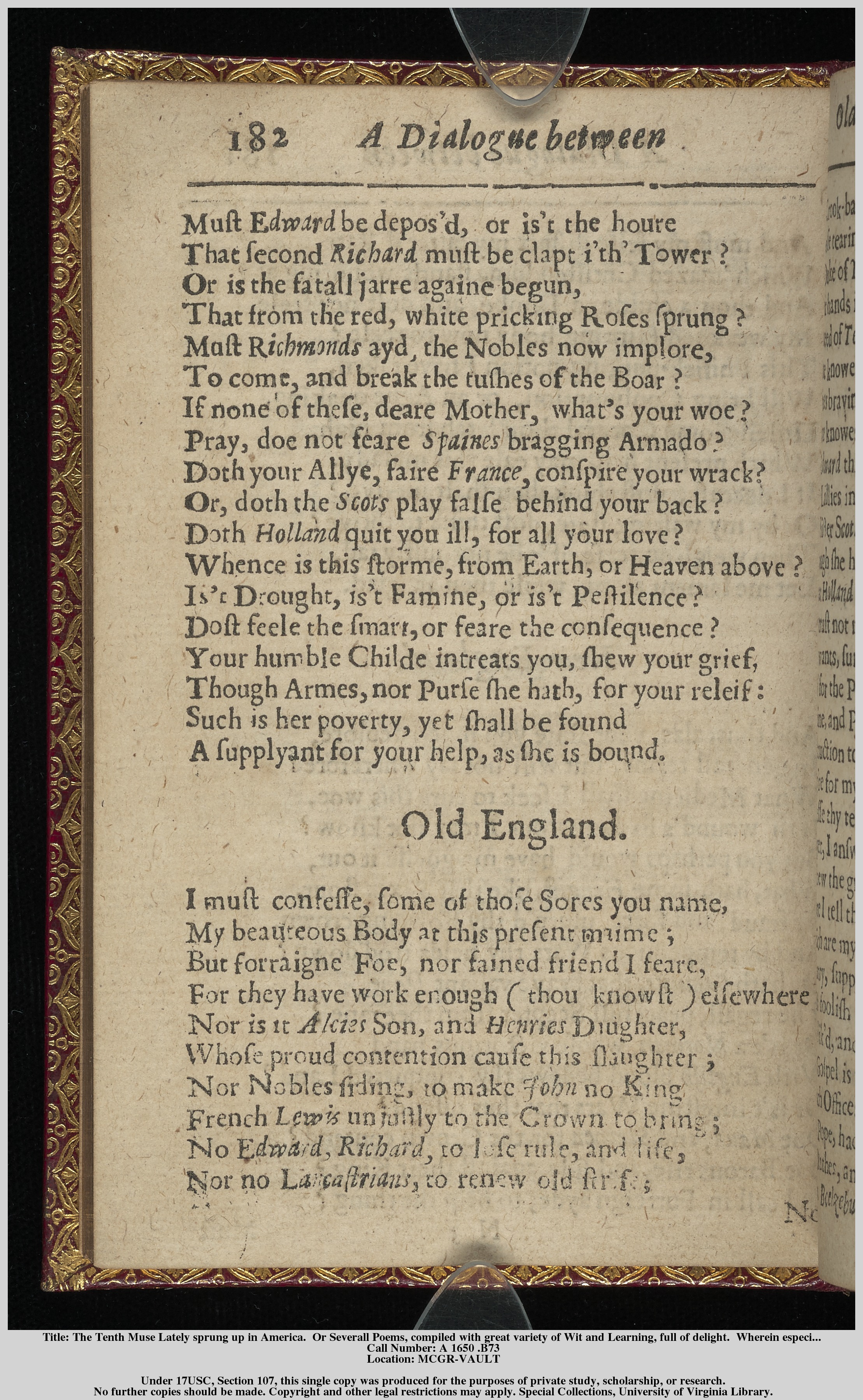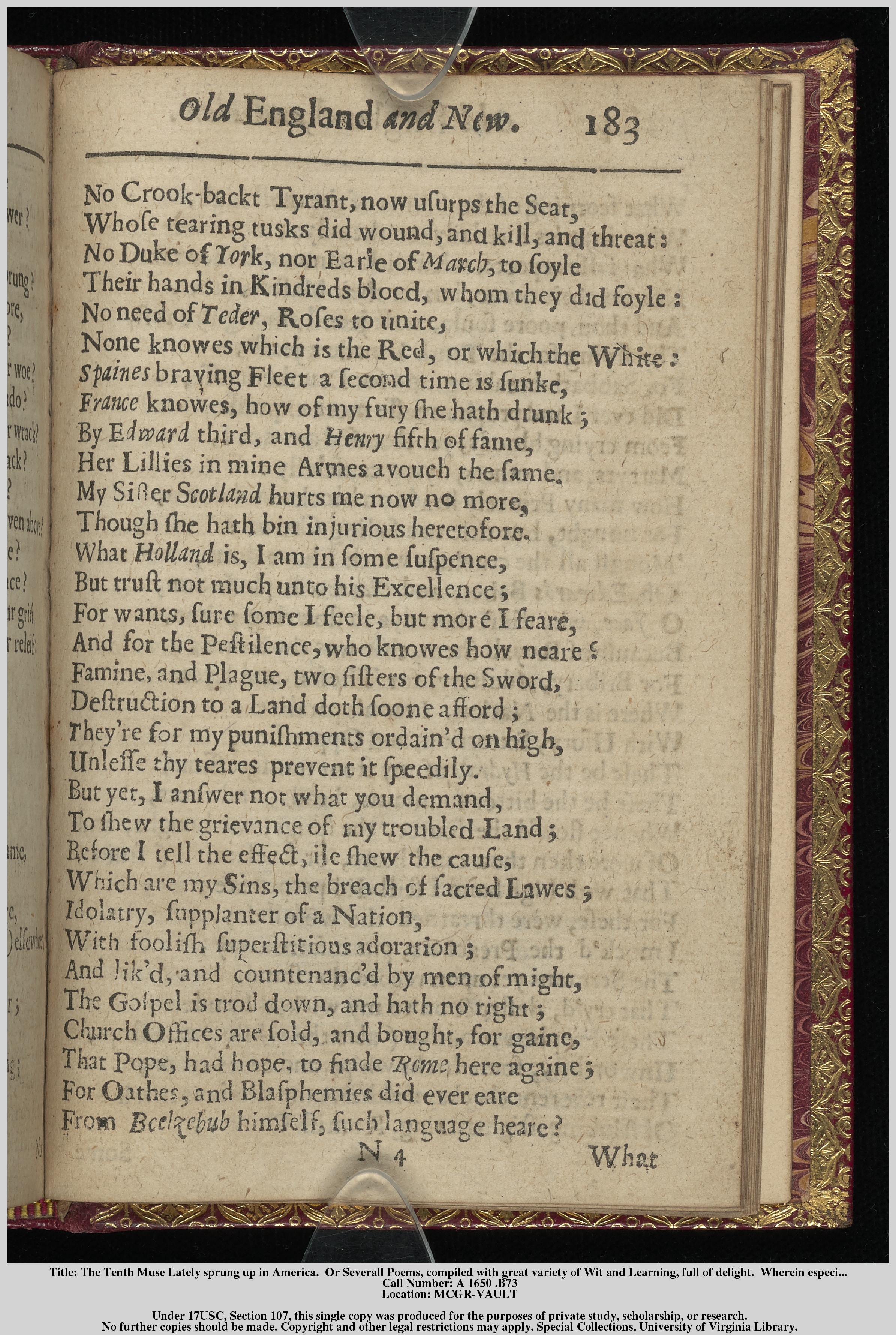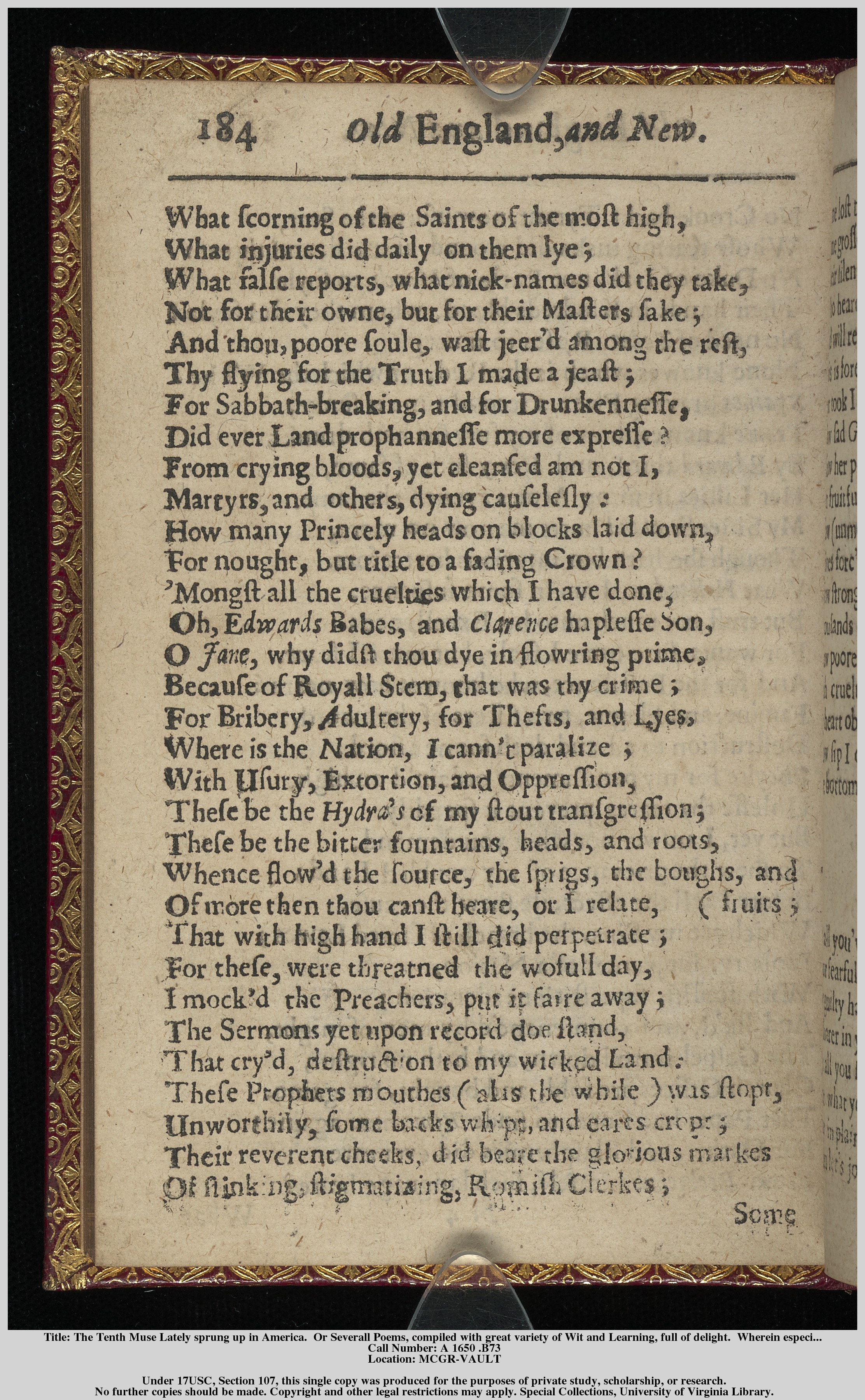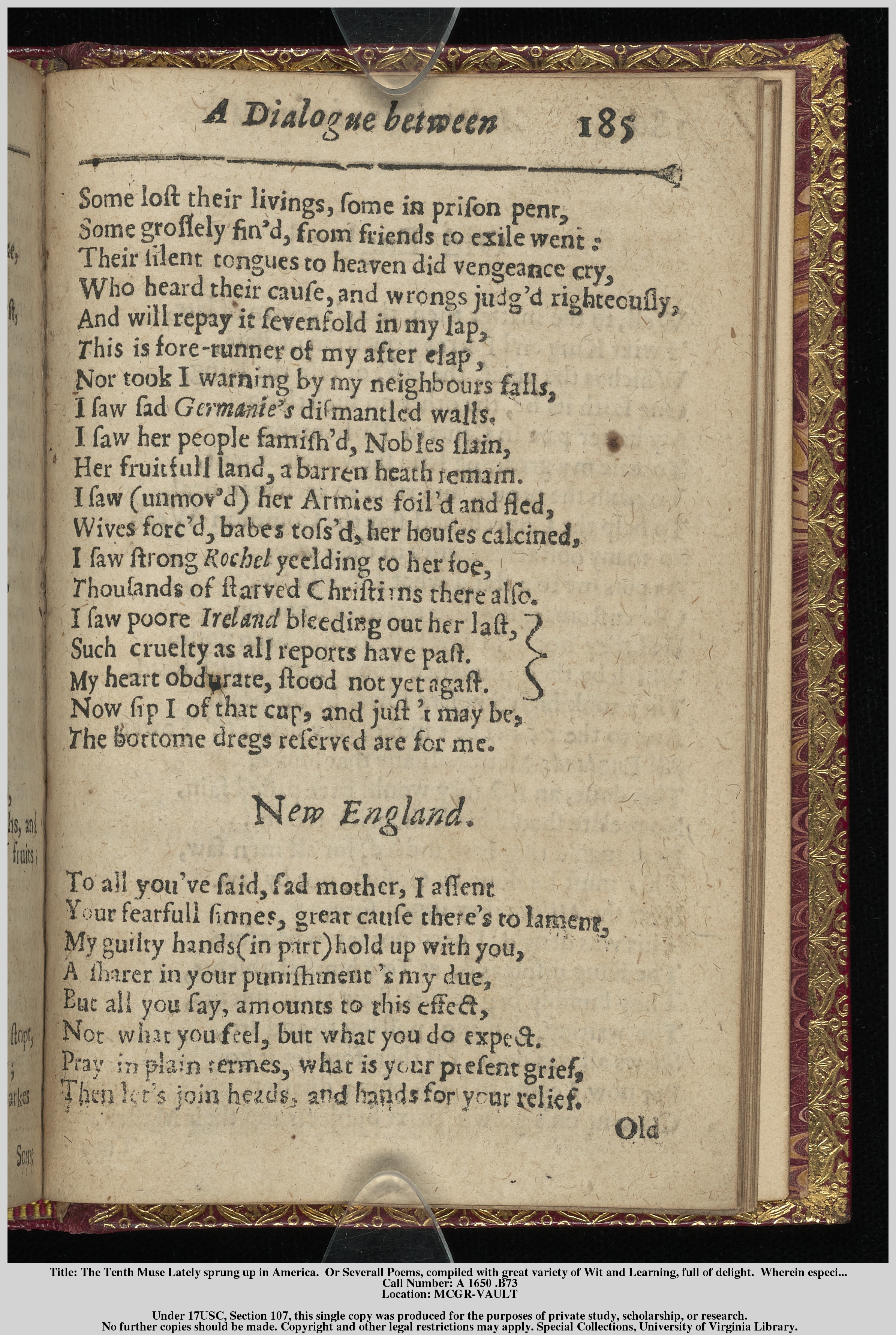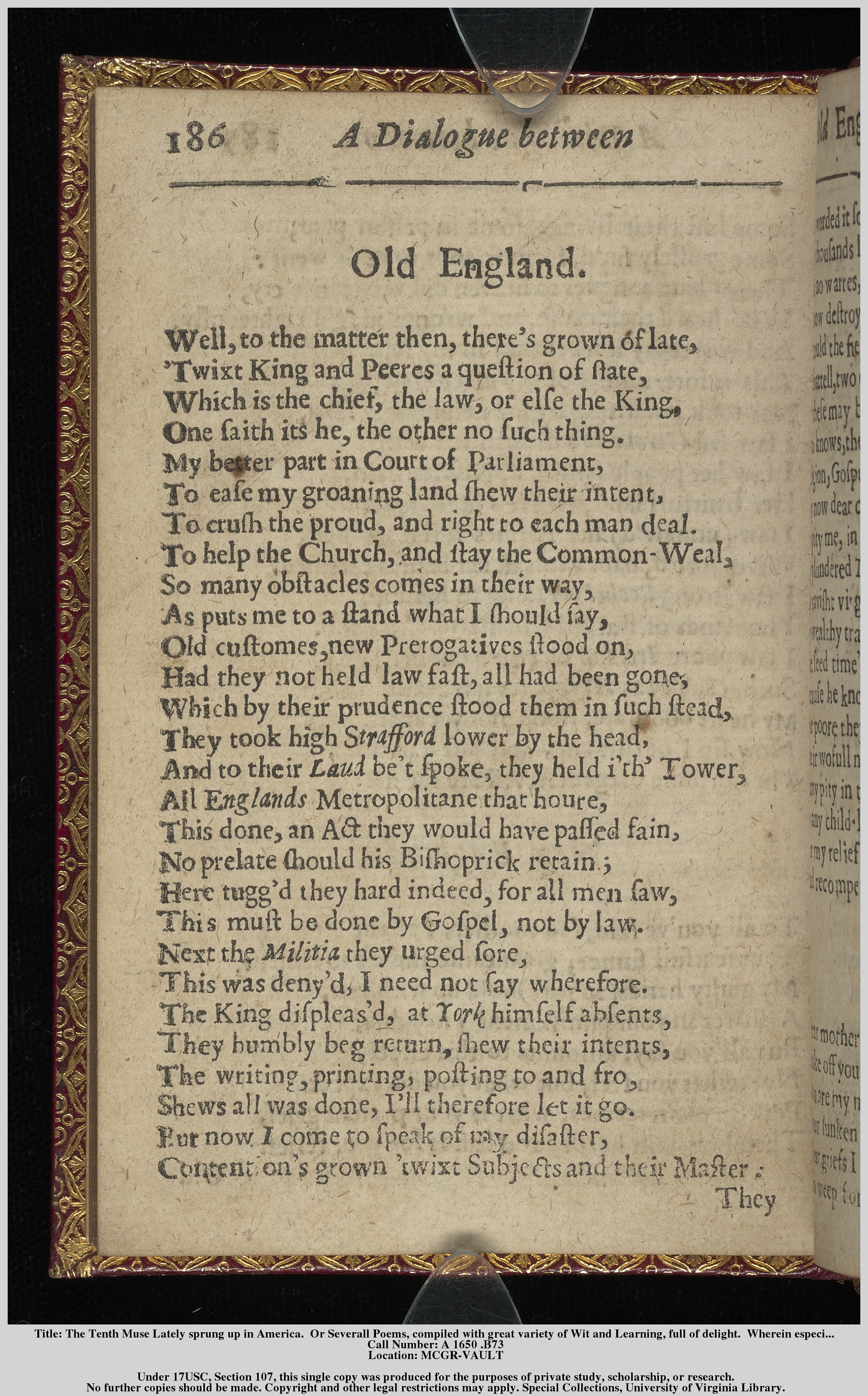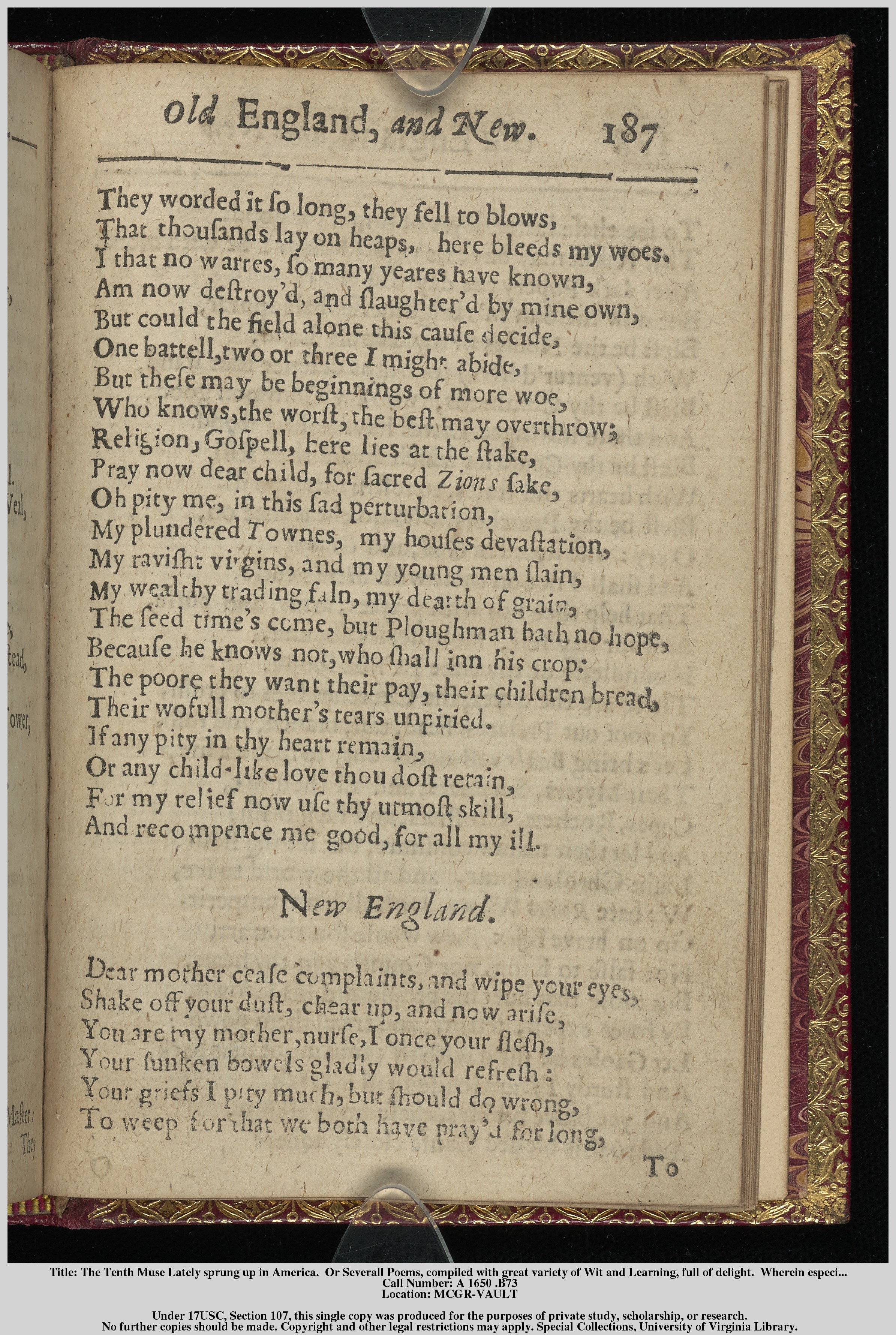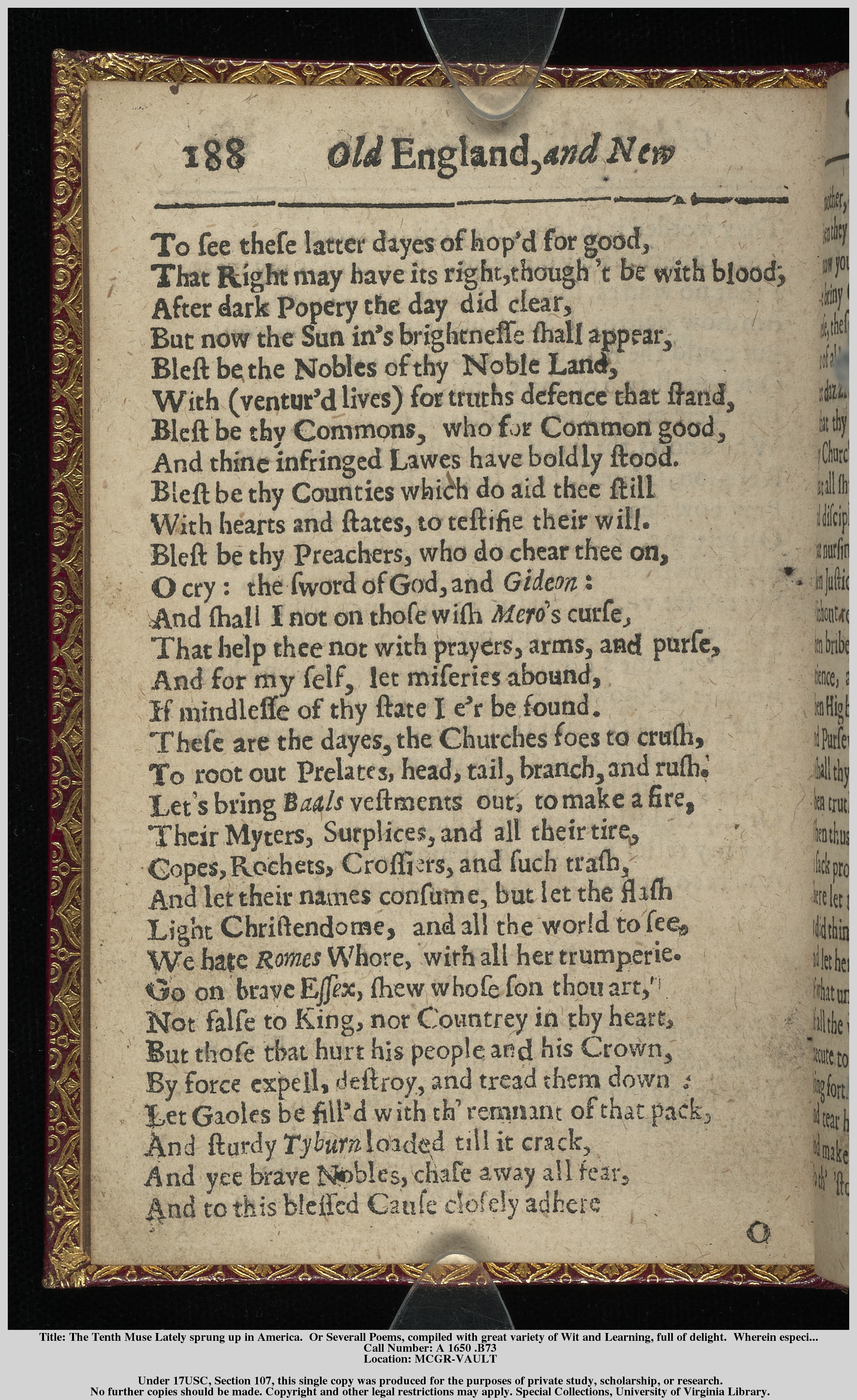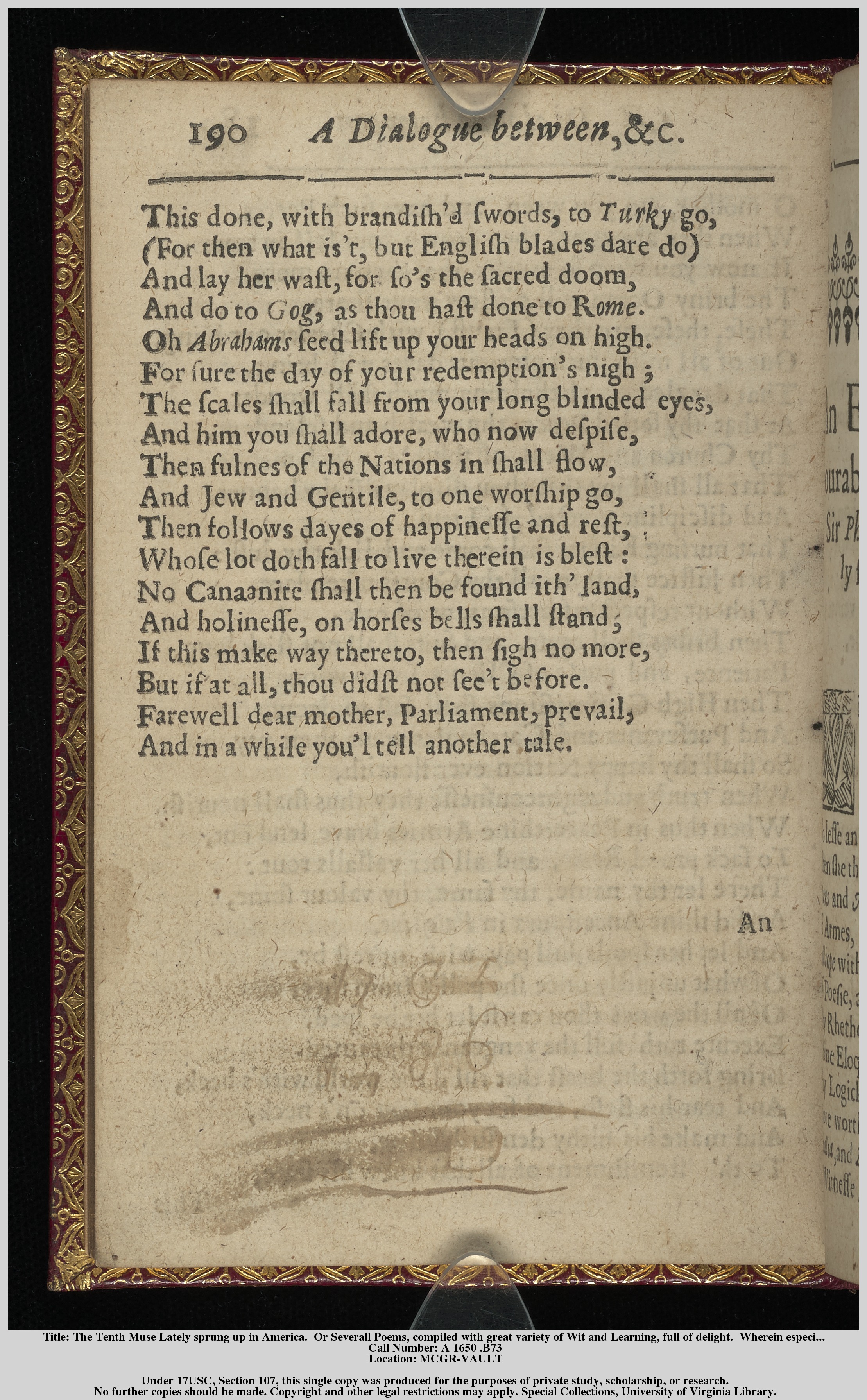“A Dialogue between Old and New England” was first printed in Bradstreet’s collection of poems entitled The Tenth Muse, which was published in London in 1650. Cast in the form of a conversation between two women who represent the New England where Anne Bradstreet had made her home and the “mother” country that she had left, this is a very political poem, a fact that the poet signals by putting the year “1642” in the title. 1642 was the year when the English Parliament and the Stuart king Charles I took their conflicts over the extent of their respective powers to the battlefield, beginning the English Civil War that ended with Charles’s execution in 1649 and the installation of Oliver Cromwell as the Lord Protector of the English Commonwealth government. That is, 1642 was the point at which politics had seemed to break down completely, when what Bradstreet, writing from Massachusetts, called “Old England” was faced with the most urgent crisis it had experienced since the end of the Wars of the Roses in 1485. What seems on the one hand to be a domestic conversation turns out to be a meditation on how England fell into its current state of civil war, and a prayer that the mother country might find itself restored to its rightful place as a leader among the Christian nations of Europe.
Though we can not know who put the poems in the order in which they appeared in The Tenth Muse–whether it was Bradstreet herself, the brother-in-law who brought the poems from Massachusetts to England, or the London publisher Stephen Bowtell, who first issued the book–this poem seems to have been placed in the volume with some care and intention. “A Dialogue” is positioned in the volume after a very long poem entitled “Of the Four Monarchies of the World,” that traces a sequence of monarchies in world history: the Assyrian, the Persian, the Greek, and the Roman. “Of the Four Monarchies of the World” ends with the fall of Tarquin, who was, according to legend, the last Roman king before the emergence of the Roman Republic: “The government they change, a new one bring,/And people sweare, ne’re to accept of King.” Placing “A Dialogue between Old and New England,” which is about the perilous state of the English monarchy right after this poem about the fall of other kings would seem to be a way of sending a message, or at least of raising a question: will England follow the course of these other monarchies by getting rid of its king permanently and becoming a Parliamentary republic? Or does the fact that it is a Christian, rather than a pagan nation like those others, change anything? The question is implied, but never answered. It is just the kind of question, though, that an American poet, a Puritan deeply read in Biblical and ancient history like Bradstreet, and one writing at a distance from the conflict back in Europe, might feel free to raise.
A Dialogue between Old England and New; concerning their present Troubles,
Anno, 1642.
New-England.
Alas dear Mother, fairest Queen and best,
With honour, wealth, and peace, happy and blest;
What ails thee hang thy head, & cross thine arms?
And sit i’th’ dust, to sigh these sad alarms?
What deluge of new woes thus over-whelme
The glories of thy ever famous Realme?
What means this wailing tone, this mournful guise?
Ah, tell thy daughter, she may sympathize.
Old England.
Art ignorant indeed of these my woes?
Or must my forced tongue these griefs disclose?
And must my self dissect my tatter’d state,
Which ‘mazed Christendome stands wondring at?
And thou a Child, a Limbe and dost not feel
My fainting weakned body now to reel?
This Physick purging potion, I have taken,
Will bring consumption, or an Ague quaking,
Unless some Cordial, thou fetch from high,
Which present help may ease my malady.
If I decease, dost think thou shalt survive?
Or by my wasting state dost think to thrive?
Then weigh our case, if ‘t be not justly sad;
Let me lament alone, while thou art glad.
New-England.
And thus (alas) your state you much deplore
In general terms, but will not say wherefore:
What medicine shall I seek to cure this woe,
If th’ wound so dangerous I may not know.
But you perhaps, would have me guess it out:
What hath some Hengist like that Saxon stout
By fraud or force usurp’d thy flowring crown,
Or by tempestuous warrs thy fields trod down?
Or hath Canutus, that brave valiant Dane
The Regal peacefull Scepter from thee tane?
Or is’t a Norman, whose victorious hand
With English blood bedews thy conquered land?
Or is’t Intestine warrs that thus offend?
Do Maud and Stephen for the crown contend?
Do Barons rise and side against their King,
And call in foraign aid to help the thing?
Must Edward be depos’d? or is’t the hour
That second Richard must be clapt i’th tower?
Or is’t the fatal jarre, again begun
That from the red white pricking roses sprung?
Must Richmonds aid, the Nobles now implore?
To come and break the Tushes of the Boar,
If none of these dear Mother, what’s your woe?
Pray do you fear Spains bragging Armado?
Doth your Allye, fair France, conspire your wrack,
Or do the Scots play false, behind your back?
Doth Holland quit you ill for all your love?
Whence is the storm from Earth or Heaven above?
Is’t drought, is’t famine, or is’t pestilence?
Dost feel the smart, or fear the Consequence?
Your humble Child intreats you, shew your grief,
Though Arms, nor Purse she hath for your relief,
Such is her poverty, yet shall be found
A Suppliant for your help, as she is bound.
Old England.
I must confess some of those sores you name,
My beauteous body at this present maime;
But forreign foe, nor feigned friend I fear,
For they have work enough (thou knowst) else∣where
Nor is it Alcies Son, nor Henryes daughter;
Whose proud contention cause this slaughter,
Nor Nobles siding, to make John no King,
French Jews unjustly to the Crown to bring;
No Edward, Richard, to lose rule and life,
Nor no Lancastrians to renew old strife:
No Duke of York, nor Earl of March to soyle
Their hands in kindreds blood whom they did foil
No crafty Tyrant now usurps the Seat.
Who Nephews slew that so he might be great;
No need of Tudor, Roses to unite,
None knows which is the red, or which the white;
Spains braving Fleet a second time is sunk,
France knows how oft my fury she hath drunk:
By Edward third and Henry fifth of fame.
Her Lillies in mine Arms avouch the same.
My Sister Scotland hurts me now no more.
Though she hath been injurious heretofore;
What Holland is I am in some suspence?
But trust not much unto his excellence.
For wants, sure some I feel, but more I fear,
And for the Pestilence, who knows how near;
Famine and Plague, two Sisters of the Sword,
Destruction to a Land, doth soon afford:
They’re for my punishment ordain’d on high,
Unless our tears prevent it speedily.
But yet I Answer not what you demand.
To shew the grievance of my troubled Land?
Before I tell th’ Effect, I’le shew the Cause
Which are my sins the breach of sacred Laws,
Idolatry supplanter of a Nation,
With foolish Superstitious Adoration,
Are lik’d and countenanc’d by men of might,
The Gospel troden down and hath no right
Church Offices were sold and bought for gain,
That Pope had hope to find, Rome here again,
For Oaths and Blasphemies, did ever Ear.
From Belzebub himself such language hear?
What scorning of the Saints of the most high?
What injuries did daily on them lye?
What false reports, what nick-names did they take
Not for their own, but for their Masters sake?
And thou poor soul, wert jeer’d among the rest,
Thy flying for the truth was made a jest.
For Sabbath-breaking, and for drunkenness,
Did ever land profaness more express?
From crying blood yet cleansed am not I,
Martyres and others, dying causelesly.
How many princely heads on blocks laid down
For nought but title to a fading crown?
‘Mongst all the crueltyes by great ones done
Of Edwards youths, and Clarence hapless son,
O Jane why didst thou dye in flowring prime?
Because of royal stem, that was thy crime.
For bribery Adultery and lyes.
Where is the nation, I can’t parallize
With usury, extortion and oppression,
These be the Hydraes of my stout transgression.
These be the bitter fountains, heads and roots,
Whence flow’d the source, the sprigs, the boughs & fruits
Of more then thou canst hear or I relate,
That with high hand I still did perpetrate:
For these were threatned the wofull day,
I mockt the Preachers, put it far away;
The Sermons yet upon Record do stand
That cri’d destruction to my wicked land:
I then believ’d not, now I feel and see,
The plague of stubborn incredulity.
Some lost their livings, some in prison pent,
Some fin’d from house & friends to exile went.
Their silent tongues to heaven did vengeance cry.
Who saw their wrongs & hath judg’d righteously
And will repay it seven-fold in my lap:
This is fore-runner of my Afterclap.
Nor took I warning by my neighbours falls,
I saw sad Germanyes dismantled walls,
I saw her people famish’d, Nobles slain,
Her fruitfull land, a barren Heath remain.
I saw unmov’d, her Armyes foil’d and fled,
Wives forc’d, babes toss’d, her houses calcined.
I saw strong Rochel yielded to her Foe,
Thousands of starved Christians there also.
I saw poor Ireland bleeding out her last,
Such crueltyes as all reports have past;
Mine heart obdurate stood not yet agast.
Now sip I of that cup, and just’t may be
The bottome dreggs reserved are for me.
New-England.
To all you’ve said, sad Mother I assent.
Your fearfull sins great cause there’s to lament,
My guilty hands in part, hold up with you,
A Sharer in your punishment’s my due.
But all you say amounts to this effect,
Not what you feel, but what you do expect,
Pray in plain terms, what is your present grief?
Then let’s joyn heads & hearts for your relief.
Old England.
Well to the matter then, there’s grown of late
‘Twixt King and Peers a Question of State,
Which is the chief, the Law, or else the King.
One said, it’s he, the other no such thing.
‘Tis said, my beter part in Parliament
To ease my grouning Land, shew’d their intent,
To crush the proud, and right to each man deal.
To help the Church, and stay the Common-weal.
So many Obstacles came in their way,
As puts me to a stand what I should say;
Old customes, new Prerogatives stood on,
Had they not held Law fast, all had been gone:
Which by their prudence stood them in such stead
They took high Strafford lower by the head.
And to their Laud be’t spoke, they held i’th tower
All Englands Metropolitane that hour;
This done, an act they would have passed fain,
No Prelate should his Bishoprick retain;
Here tugg’d they hard (indeed,) for all men saw
This must be done by Gospel, not by Law.
Next the Militia they urged sore,
This was deny’d, (I need not say wherefore)
The King displeas’d at York, himself absents,
They humbly beg return, shew their intents;
The writing, printing, posting too and fro,
Shews all was done, I’le therefore let it go.
But now I come to speak of my disaster,
Contention grown, ‘twixt Subjects & their Master;
They worded it so long, they fell to blows,
That thousands lay on heaps, here bleeds my woes,
I that no wars so many years have known,
Am now destroy’d and slaught’red by mine own;
But could the Field alone this strife decide,
One Battel two or three I might abide:
But these may be beginnings of more woe
Who knows, but this may be my overthrow.
Oh pity me in this sad perturbation,
My plundred Towns, my houses devastation,
My weeping Virgins and my young men slain;
My wealthy trading fall’n, my dearth of grain.
The seed-times come, but ploughman hath no hope
Because he knows not, who shall inn his Crop:
The poor they want their pay, their children bread,
Their woful Mothers tears unpittied,
If any pity in thy heart remain,
Or any child-like love thou dost retain,
For my relief, do what there lyes in thee,
And recompence that good I’ve done to thee.
New-England.
Dear Mother cease complaints, & wipe your eyes,
Shake off your dust, chear up, and now arise,
You are my Mother Nurse, and I your flesh,
Your sunken bowels gladly would refresh,
Your griefs I pity, but soon hope to see,
Out of your troubles much good fruit to be;
To see those latter dayes of hop’d for good,
Though now beclouded all with tears and blood:
After dark Popery the day did clear,
But now the Sun in’s brightness shall appear.
Blest be the Nobles of thy noble Land,
With ventur’d lives for Truths defence that stand.
Blest be thy Commons, who for common good,
And thy infringed Laws have boldly stood.
Blest be thy Counties, who did aid thee still,
With hearts and States to testifie their will.
Blest be thy Preachers who do chear thee on,
O cry the Sword of God and Gideon;
And shall I not on them wish Mero‘s curse,
That help thee not with prayers, Arms and purse?
And for my self let miseries abound,
If mindless of thy State I e’re be found.
These are the dayes the Churches foes to crush,
To root out Popelings head, tail, branch and rush;
Let’s bring Baals vestments forth to make a fire,
Their Mytires, Surplices, and all their Tire,
Copes, Rotchets, Crossiers, and such empty trash,
And let their Names consume, but let the flash
Light Christendome, and all the world to see
We hate Romes whore, with all her trumpery.
Go on brave Essex with a Loyal heart,
Not false to King, nor to the better part;
But those that hurt his people and his Crown,
As duty binds, expel and tread them down.
And ye brave Nobles chase away all fear,
And to this hopeful Cause closely adhere;
O Mother can you weep, and have such Peers,
When they are gone, then drown your self in tears
If now you weep so much, that then no more
The briny Ocean will o’reflow your shore.
These, these are they I trust, with Charles our King,
Out of all mists such glorious dayes shall bring;
That dazled eyes beholding much shall wonder
At that thy setled peace, thy wealth and splendor.
Thy Church and weal establish’d in such manner
That all shall joy, that thou display’dst thy Banner;
And discipline erected so I trust,
That nursing Kings shall come and lick thy dust:
Then Justice shall in all thy Courts take place,
Without respect of person, or of case;
Then Bribes shall cease, & Suits shall not stick long
Patience and purse of Clients oft to wrong:
Then high Commissions shall fall to decay,
And Pursivants, and Catchpoles want their pay.
So shall thy happy Nation ever flourish,
When truth & righteousnes they thus shall nourish
When thus in peace, thine Armies brave send out,
To sack proud Rome, and all her Vassals rout;
There let thy Name, thy fame, and glory shine,
As did thine Ancestors in Palestine:
And let her spoyls full pay, with Interest be,
Of what unjustly once she poll’d from thee.
Of all the woes thou canst, let her be sped,
And on her pour the vengeance threatned;
Bring forth the Beast that rul’d the World with’s beck,
And tear his flesh, & set your feet on’s neck;
And make his filthy Den so desolate,
To th’ stonishment of all that knew his state:
This done, with brandish’d Swords to Turky goe,
For then what is’t, but English blades dare do,
And lay her waste for so’s the sacred Doom,
And do to Gog as thou hast done to Rome.
Oh Abraham‘s seed lift up your heads on high,
For sure the day of your Redemption’s nigh;
The Scales shall fall from your long blinded eyes,
And him you shall adore who now despise,
Then fulness of the Nations in shall flow,
And Jew and Gentile to one worship go;
Then follows dayes of happiness and rest;
Whose lot doth fall to live therein is blest:
No Canaanite shall then be found i’th’ Land,
And holiness on horses bells shall stand.
If this make way thereto, then sigh no more,
But if at all, thou didst not see’t before;
Farewel dear Mother, rightest cause prevail,
And in a while, you’le tell another tale.


